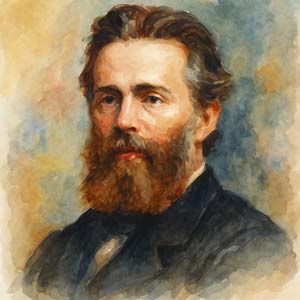— Herman Melville

Novelist Herman Melville (1819–1891) was born on this day in New York City, the third of eight children. At age 21, he joined a whaling ship and spent years exploring the South Seas, including time in Lahaina, Honolulu, and Tahiti.
“Life’s a voyage that's homeward bound,” he once observed.
His seafaring adventures celebrated imagination and spirit. His first-hand encounters with the cannibals of the Marquesas inspired his debut novel, Typee (1846). In Omoo (1847), Melville recounted a mutiny and Tahitian jail escape—stories that inspired Robert Louis Stevenson's Pacific travels.
In 1847, Melville married and bought a farm in Massachusetts. He shared ideas with Ralph Waldo Emerson's Transcendentalist group and was close friends with writer Nathaniel Hawthorne.
Claiming to have "merely described what he has seen," Melville is best known for his epic Moby-Dick (1851). From its famous opening, "Call me Ishmael," the novel chronicled Captain Ahab's obsessive quest to destroy the great White Whale—a metaphor for human frailty, pride, and revenge.
“There is a woe that is wisdom, a woe that is madness,” Melville wrote.
Despite the brilliance of his work, literary fame was elusive during his lifetime. His final novel, Billy Budd (1891), was published posthumously. “It is better to fail in originality than to succeed in imitation,” he said.
In 1984, Melville was honored with a twenty-cent commemorative postage stamp.
 Keep method to your madness.✨
Keep method to your madness.✨
